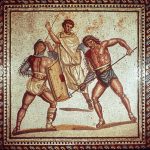Gladiators fighting in the arenas were not condemned to eternal life in captivity and fight for their lives, to the delight of the crowds. Certainly many have won their freedom, as evidenced by the stories of ancient historians.
Fighting in the arena did not always end with the death of gladiators, which was due to the fact that the cost of the slave and the money put into his training were in practice to anyone’s hands. What’s more, gladiators could count on good medical care and earnings. Gladiators who were brave and creative at striking in the struggle could count on the recognition of the crowds, the sponsor of the games (editor) and even the emperor. In return, they received a laurel wreath, money and even liberation (manumisso).
We know the message of Martial, where two gladiators – Priscus and Verus – fought bravely enough that emperor Titus recognized them with both winners and gave them a wooden training sword (rudis) as a symbol of freedom. Another gladiator – Flamma – received rudis four times, but he preferred to stay in the arena. Evidence of this is the preserved tombstone in Sicily: “Flamma, secutor, lived 30 years, fought 34 times, won 21 times, fought to a draw 9 times, defeated 4 times, a Syrian by nationality. Delicatus made this for his deserving comrade-in-arms.”







